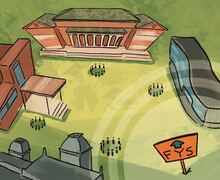Mayor Walsh, Common Council seek greater oversight of tobacco retailers through new legislation
Cassandra Roshu | Photo Editor
Under the new law passed by the Common Council on September 5, the city of Syracuse will not issue tobacco retail licenses to shops located within 750 feet of schools, public parks or another business operating under a current and valid tobacco retail license.
Get the latest Syracuse news delivered right to your inbox.
Subscribe to our newsletter here.
Mayor Ben Walsh hosted a public hearing Tuesday morning at Syracuse City Hall to collect feedback from the community on new regulations aimed to crack down on smoke shops selling tobacco and vaping products to underage customers.
The Syracuse Common Council on Sept. 5 unanimously passed a bill requiring all retailers who sell tobacco products to apply for a new local license. Under the new law, the city will not issue tobacco retail licenses to shops located within 750 feet of schools, public parks or another business operating under a current and valid tobacco retail license.
Current shops that sell tobacco and electronic smoking products will be grandfathered in under the new regulations. Applicants must pay an annual, non-refundable $250 fee for the license, according to the bill.
Brittany Taylor, a Syracuse resident who serves as a community impact director for the American Heart Association in central New York and northeastern Pennsylvania, said the new regulations are in the best interest of the children in Syracuse. The bill also allows the city to take a step toward health equity — an issue which Walsh addressed during his 2023 State of the City.
“The health of our community is on the line, and these requirements will allow Syracuse officials to know where tobacco products are being sold and give officials stronger oversight through regular compliance checks,” Taylor said.
Shops with an official state license to sell smoking products must also now apply for a city license once a year through the City of Syracuse’s Division of Code Enforcement. Applicants for the new city license must present necessary documentation to operate in New York state and be free from outstanding taxes, fines and other charges, among other requirements listed in the bill.
The city will not issue licenses to stores with outstanding fines and violations from the Onondaga County Health Department, said Lisa Letteney, the director of environmental health for the OCHD. The city will begin enforcing the new regulations on Oct. 1.

Arlo Stone | Digital Design Director
Martha Ryan, a three-time survivor of breast cancer who attended the hearing, spoke about the consequences of underage smoking on developing brains — including asthma, headaches, reduced physical fitness and other long-term health complications.
“In the interest of public health and helping to build and sustain a healthier community, we interested community members and the leaders of our community need to do everything that we can to reduce and eliminate tobacco as a public health threat,” Ryan said.
The new bill also aims to gradually reduce the number of shops in the Syracuse area, which includes 179 tobacco and vape retailers, said Karyn Johnson, program coordinator for Tobacco-Free CNY, an organization administered by the OCHD which aims to reduce illness and death related to tobacco use through education and advocacy.
For every two licenses either revoked or expired during a year, the city’s Division of Code Enforcement will only issue one tobacco retail license starting the next year, according to the bill.
According to OCHD data, 155 of the city’s total retailers that sell tobacco products, or approximately 86% of retailers, reside within 750 feet of a K-12 school, park or another tobacco vendor.
The locations tend to target low-income neighborhoods, Johnson said. In Syracuse, there are 1.34 tobacco retailers in lower income neighborhoods for every 1,000 residents compared to 0.46 per every 1,000 residents in higher income neighborhoods, according to the OCHD.
Locations that fail to follow the new regulations will face a civil penalty of $3,500 for the first violation, followed by up to $7,000 and $10,000 for second and third violations, respectively. The city’s Division of Code Enforcement will also hold hearings for violators, which could result in a suspension of tobacco retail licenses for up to 12 months or outright revocation.
Patrick Hogan — chair of the council’s economic development, downtown and metropolitan planning committee — said Walsh and the city sought to make a firm statement through the new regulations by targeting underage smoking.
Approximately 8% of New York state retailers surveyed between April 1, 2018 and March 21, 2020 admitted to illegally selling smoking products to minors, according to a report by the state’s health department cited in the bill. Roughly one in every four high school students in New York state use some form of tobacco product, according to the bill.
Smoking remains the leading preventable cause of death per year in the United States, according to the Center for Disease Control and Prevention. Approximately 22,000 state residents die annually due to smoking and secondhand smoking.
Hogan said teen and preteen smoking feels more widespread than ever in the Syracuse area and hopes the new regulations will serve the health and safety of the city’s community.
“Part of our mission is to have healthy neighborhoods in our city and certainly this tobacco legislation is something we want to address especially with the prevalence of tobacco use and vaping in our younger population,” Hogan said. “We thought this was a way to regulate the tobacco use among younger folks in the population at large.”
Published on September 12, 2023 at 10:56 pm
Contact Dominic: dcchiapp@syr.edu | @DominicChiappo2





